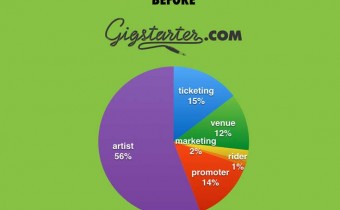Communication Breakdown
Unconvention’s Jeff Thompson flags up the importance of good communication and how it can make all the difference to a musician or band’s career.
Next week Off Axis heads to Hastings for our first show on the south coast, which we’re really excited about. Once again we have some fantastic artists working together to make opportunities for one another. Things are coming together great, and as ever, we’re spending a lot of our time talking to bands from all across the country.
For this post I wanted to write a little something about my observations recently as I think there could be one or two useful pointers for artists at a particular stage in their career. Over the last year or so that we’ve been communicating with bands there’s something that’s really struck me – how difficult it can be to get in touch with some bands (and this certainly doesn’t apply to ALL bands, but I’m surprised how many it does include).
Anyone who works in the industry will know the struggles of trying to get through to booking agents, festivals, radio producers and so on – it can seem a relentless job getting hold of some people. Of course, people in those roles are usually inundated, and hence getting through to them on email may be a real struggle – your email is just one of hundreds they might receive that day, and if it’s not immediately relevant it could quite easily find itself in the trash without ever being properly read.
What we’re finding with artists though is they fall into two very distinct categories when it comes to communication – i.e. good and not so good. It’s worth pointing out that we’re working with a certain level of artist here – they’re usually experienced, have a good following, and are certainly passionate about what they do. I’ve done a few panels recently (I also run music conferences) about the distinction between being amateur and professional, and when music is more than just a hobby, but at the same time is some way from being a ‘job’. It’s an interesting debate in the music industry – there can be a huge gap between the need (and desire) to commit as much time and effort to making music required to pursue a career (or some level of ‘success;), and indeed the time when that commitment produces any kind of financial return. That in itself I believe has always been the case, the juggling of work commitments and mid week long distance gigs, sneaking out early without the boss noticing in order to make soundcheck, coordinating annual leave to book some studio time – these are things that all bands go through.
Off the back of that debate, another thing we’ve been talking about at recent events is the need to for a common understanding on the ambitions and commitment of band members. Being in a band (as opposed to a solo artist) is a curious position to be in. Each individual member will have his or her own understanding of what being committed means – and if there’s too much variation in that understanding then problems occur – after all, a band is only as strong as it’s weakest link, especially when it comes to taking opportunities. If three of the band are prepared to get out of work early to make that last minute gig offer in London, but the drummer can’t do it because he’s going to the football that night then tensions will occur. Of course, it will happen from time to time, and it can’t be avoided on occasions, but on the whole everyone needs to be in sync. It’s fine if everyone wants to be in a band because they enjoy playing once in a while, and gigs are organised sporadically, and months in advance. If that is clear to everyone, and everyone is happy with that then that is great, and of course in some ways it will determine the progress of the band. On the other hand if you have a band that has decided they are going to put everything in to making things happen – then that is a different commitment and again everyone has to understand and agree to that. Bands (and it can change at different stages of their lifespan) might be either at the ‘hobbyist’ (for want of a better word), or ‘going for it’ (for want of a better phrase) end of the spectrum. Both are great places to be, so long as all of the individual members are agreed on where they’re at.
And of course, back to the point about the definition of amateur versus professional – it’s too simplistic to think that you’re ‘amateur’ until you’re getting paid to do something – the truth is, in order to succeed you need to be ‘professional’ a long time (many years in most cases) before it becomes something you do ‘for a living’. The bands I work with (I also run a label) are as professional and committed, perhaps even more so, than many bigger artists – being a professional musician is determined by your mindset rather than your bank balance.
All of this brings me back to where I started. The bands we are working with on Off Axis are indeed the ones with the professional mindsets and an understanding of their collective commitment and goals. And yet, at times, there still seems to be an issue with communication. I wanted to point out this isn’t just my experience with Off Axis, I also booked bands to play at large events (with crowds in the many thousands), and at other events where there are good fees on offer, and the same issues arise.
Usually I contact bands using the email address on their website or Facebook ‘about’ section. Invariably the address is along the lines of ‘bookings@ourbandname.com’ or ‘bookings@bandname.hotmail.co.uk’. Now that in itself makes sense, again we’ve done many a panel at conferences about the need to portray a professional image, and how davybigbelly82@gmail.com doesn’t always give the right impression to promoters or labels. BUT – the only point of giving the bookings@bandname.hotmail.co.uk address is if you check it regularly! I saw a presentation recently about ‘deadly sins’ of social media where having things like a redundant Twitter account, or a ‘Latest News’ section on a bands website where the last entry was a year ago can be very damaging. Basically, if you’re not going to use something then don’t have it. This is kind of the same thing. Yes, there’s a paradox here – a ‘professional’ email address is a good thing, but it’s useless if it is not actually used. My believe is that in many cases it is because bands are expecting to be proactive rather than reactive – they are expecting to have to chase gigs themselves, rather than getting offers out of the blue sent to them. It may be that they are only expecting to use that address at certain times. Even still, if you set up an account like that, and then display it as your point of contact then this is where opportunities (expected or not) will be directed – and of course it isn’t too tricky to set up on your phone or email software, even if it’s only to receive the occasional message.
As I said at the beginning, there seem to be two kinds of bands. The ones that respond promptly and the ones who don’t. It’s not too tricky to work out who get the most opportunities. I was talking recently to a friend who worked for a national radio station about this very thing and she said she found it the same. She would find a contact online for a band, usually for a fairly last minute, but significant opportunity, and often wouldn’t even get a reply, or if she did it would be a week later, and of course those kinds of opportunities go elsewhere pretty swiftly.
Anyway, the way it usually goes with these kinds of emails is I send some information about an opportunity to the bookings@myband type address. I wait a few days (thinking the band are probably just ringing round to check availability – that always has to happen). Then nothing. Then, I’ll try following up on the bands Facebook (I don’t imagine many promoters would bother). Often this works, and as a result of course, Facebook is now often my first (although not preferred) port of call. The response on Facebook will often be along the lines of, ‘wow, this sounds great, we’ll check our email’, or ‘wow, this sounds great, can you resend the info to my davybigbelly82@gmail.com address’. Sometimes a message to the bands Facebook also doesn’t solicit a response – usually the last post on there is weeks old. In this case, I’ll try and find the personal Facebook of one of the band members (I imagine even less promoters would go to that effort), and usually that gets a response – again along the lines of ‘wow, this sounds great! Sorry, I haven’t checked the bands email in a while, can you resend the info to my davybigbelly82@gmail.com address’. You get the idea. In fact sometimes that doesn’t work (after all Facebook isn’t the keeper of all human communication yet) and I have to track down a band that I know have played with the band recently to see if they have a number. Phone numbers almost always work for getting an immediate response. People seem to act on a text or a phone call in a way they don’t to an email or Facebook message.
As a result, we’re tentatively looking into introducing SMS into Off Axis (although it incurs overheads we’d rather avoid), but for now, and a much better solution, we’re asking the artists we’re working with to give us email addresses they actually use and check (sounds obvious, but there’s a learning curve there). We would rather have the davybigbelly82@gmail.com address, over the ‘band account’ that’s gathering dust on a server somewhere.
When bands register they get this message:
Email Address (IMPORTANT PLEASE READ) The Off Axis site will send you notifications via email. Please provide an email address that is checked regularly to ensure you can respond to gig requests promptly – only use your ‘gigs@bandname.com’ type address if it is one that is checked on a regular basis – otherwise please supply an appropriate personal / work address.
As I say, it seems simple enough, but it’s vital for what we’re doing.
Anyway, what’s the moral of this story?
Well, if you’re a musician you may have read numerous ideas about how to find ‘success’ in music. Of course, that discussion starts with a definition of ‘success in music’ – that’s another blog post – but on the whole they cover things like, first and foremost be brilliant, write great songs, be unique, build relationships and networks (I wrote a blog recently about networking), find your super fans, and all these kinds of ideas. I want to add two more points to that list:
1) Successful bands have a common understanding of their commitment and goals
2) They answer emails in good time
And of course the flipside of all this is there are certain bands who are brilliant at responding to stuff. They often reply to emails within minutes (often just to say, thanks for the opportunity, I’ll just check with the rest of the guys tonight and let you know tomorrow – that kind of thing) – but that simple level of communication is priceless. I have a list of bands in my head (and the friend from the radio station said the same) that I know will get back to me promptly, and whether they realise it or not that fact alone has led to me offering them countless opportunities.
So check those accounts, you may have been offered a ton of gigs and radio sessions that you knew nothing about.
And if you want to drop me a line about this blog you can get me at jeff@unconventionhub.org – I promise a prompt response!



